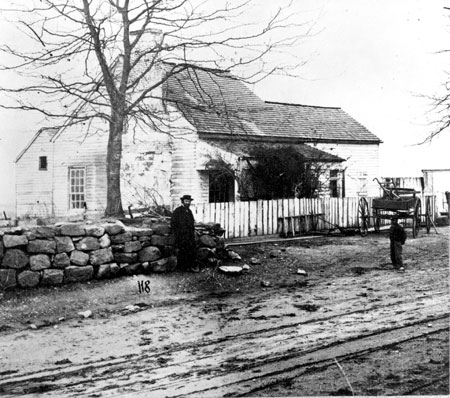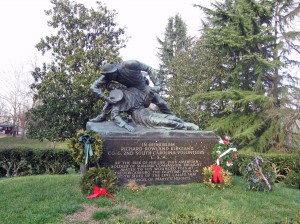Walt Whitman Cinepoem – Uses readings from the first two pages of the 1855 Song of Myself from Leaves of Grass.
Abstract: Throughout the semester, I used the FlipCams to film the sun rising over the Potomac, walking to and from school, to work, on my way back from brother’s house in Westmoreland, just life. Some of the footage is from my own camera that does small, short videos. There are three pictures I used from google images and one from Facebook; the Korean conflict memorial (from Facebook), a photo of a soldier in Vietnam, a photo of a Middle-eastern man holding an automatic gun, the infamous photo of the little girl running who had napalm on her back, and picture of Whitman’s frontispiece. I used a few videos from Youtube which I converted using vixy.net. The videos include the mob scene (which is spliced into three different spots of the cinepoem), the bomb blowing up at 4:43, the homeless person digging for food at 4:45, footage of Bloody Sunday (London) at 4:49, the three children laughing at 4:53, footage of Devil’s Marbleyard in the Blue Ridge Parkway (which I have been there, but I did not shoot it) at 4:57. I selected to use one band, The Verve, and already had the music, so I just took it from my iTunes library and added it into my iMovie production. The song at the beginning of the cinepoem is Lucky Man and the song ending the poem is Bittersweet Symphony.
Works Cited
“37 Years Later, Girl in Vietnam War Photo Spreads Hope.” Web. 10 Dec 2009. <boards.library.trutv.com/ showthread.php?t=294622>.
“children laughing.” Youtube. Web. 10 Dec 2009. <http://www.youtube.com/watch?v=y4h8f38IaZU>.
“Bloody Sunday, 30.1.1972.” Youtube. Web. 10 Dec 2009. <http://www.youtube.com/watch?v=IuBaAzH7Kkw&feature=related>.
“Fred Phelps supporters attacked by mob.” Youtube. Web. 10 Dec 2009. <http://www.youtube.com/watch?v=BrFVjg79_iM>.
“view from Devils Marbleyard in the early morning.” Youtube. Web. 10 Dec 2009. <http://www.youtube.com/watch?v=Z5sG9pOju0M>.
Whitman, Commercialism, and the Digital Age;
What does this mean for Whitman?
Today’s culture is centered on technology; literature and education are fighting to stay current. Gone are the days when families watched the sunset or sat on the porch after dinner to watch nature happen as their night’s entertainment. Also, gone is the age in which college classes are almost strictly taught by stuffy professors in front of simple blackboards, and with students writing not typing. Our seminar on Walt Whitman is a testament to the new age of education and that it is effective. Therefore, college has maintained its purpose and is still gradually changing for the future of collegiate education. Literature has amazingly survived as well, despite the odds of television, the internet, and radio; wait, not only has literature survived, it has evolved. The vessel of literature may have changed, the new technology has created another layer to analyze, but the message and meaning is still current and powerful.
The media world and literature have merged, most noticeably, in a commercial sense. Combining poetry to advertising, such as Langston Hughes’ poem A Dream Deferred used in a 2008 Nike advertising campaign, or creating movies based on renowned novels, like Pride and Prejudice in 2005, provide a transition of literature to the twenty-first century.
Walt Whitman is recognized as the culmination of patriotism, the voice of America and its culture. Through the different versions of Leaves of Grass, Walt Whitman shed his skins and it is easy to see him evolve through with the augmentations he made in each edition of Leaves of Grass. However, when he died in 1892, it would seem that the changes in tone and voice died with him. Walt was dead, and Leaves of Grass would carry on, but it could not vary in tone anymore. However, this proves to be a shortsighted claim when the medium of Whitman is changing from wood pulp to computer chips, when the words on the paper turn into commercials seen by pixels through the computer chips. The changing of the medium has brought criticism and mixed emotions about the smooth (or failed) translation of Whitman’s message that is being reintroduced to a more 21st century-friendly medium. This evolution runs the risk of the works loosing pieces of their integrity, meaning, and being dehumanized.
In the summer of 2009, the denim company, Levi’s, took on an advertising campaign that features Whitman’s poems America and Pioneers! O Pioneers! “Whitman is an involuntary spokes-celebrity here” and the lack of control he has over peoples perception of his works (for instance, having them paired with video clips he did not choose) creates palpable tension. (Stevenson) The counterargument is the idea of simply getting Whitman to the masses, the route or direction does not matter. However, the most pertinent question is “who is using who”? Is Levi’s using Walt Whitman or is Walt Whitman using Levi’s?
When answering the first part of the question, Levi’s is using Walt Whitman, especially in the commercial that uses a supposed recording of Walt Whitman reading four lines from America. Yet, the message of the commercial is one that’s distinctly anti-capitalism. Ironically, capitalism rests on advertising and commercialism to keep the capitalist-cycle going round. From the first 15 seconds to 18 seconds of the commercial, it portrays a CEO look-alike being chauffeured in a slick town car, then he is behind a dark desk in front of a large, one-paned window that shows a cityscape with skyscraper-type architecture. Both times we see the CEO, he seems disgruntled and worried; this dark play on America’s uncomfortable state is troubling. With the market down and the war on terrorism a black hole, Whitman pops through the speakers and reminds us that there is a light at the end of the tunnel; there is beauty in us despite our plight. Thus, at the end of the commercial, the viewer is left with the sounds and sights of the ad. After 58 seconds of provocative, beautiful, and patriotic scenes, the last two seconds show a red Levi’s emblem while a definite gunshot is heard after fireworks are shown booming and lighting the screen.
When the viewer thinks back to the commercial, after almost a minute of Whitman’s reading accompanied with beautiful cinematography, Levi’s motive is to get the viewer to feel inspired enough to buy their specific brand of jeans (again, that capitalist pull, quite anti-Whitman). The demographic that Levi’s caters to are ages 18-34, most people beyond or younger than this may not feel the pull which the commercialized cinepoem seeks to enforce. The scenes of the commercial show people of all ages, from all walks of life, running, jumping, laughing, and watching other people; it is powerful in showing human nature and the unpredictable way of life. In Levi’s print campaign, they are using a tagline “specific to the economy, including ‘Will work for better times’.” (Clifford B1) Obviously, if the audience does feel the pull, then the capitalist game comes full circle and the people feel good because if they are buying something for “better times”, then the better times will be here soon. Right? The completion of that cycle, no matter how “American” capitalism seems, is not the America that Whitman was advocating or would be proud of.
Granted, Whitman’s own feelings towards commercialism are scattered and unclear. Whitman “himself had permanently mixed feelings on the subject of sales” and whether he should censor himself or make more “socially appropriate” moves in his own commercialism. (Earnhart 192) The lack of direction is unsettling. Whitman was very aware and keen of the business aspect of the written word; after all, he wrote his own raving reviews to help sell Leaves of Grass. However, because the advertising world has changed so drastically since Whitman’s time, it is hard to determine if any action using his works is justified. The answer to that question lies in the context of what company would use Whitman and to what means.
Having the Whitman seminar in a digital, evolving capacity is parallel to the way Levi’s, Starbucks, and other companies have digitalized and reintroduced Whitman. In the classroom, and classroom blog spanning four different college campuses, it combines traditional, meaningful verbal discourse and analysis with a new digitalized way of learning. This would be comparable to watching a cinepoem of a selected reading from Leaves of Grass instead a traditional reading and analysis of the same reading featured in the cinepoem. The traditional reading can provide a more personal experience and relationship with Whitman. The traditional classroom experience is somewhat stagnant, rarely do field trips happen outside of high school, but part of the multi-sensory class experience includes travel, correspondence with other students studying the same concept. The way the classroom experience leaves you with multiple understandings and levels of analysis, a cinepoem can alter, enhance, and even delude your perception of the poem. If a poem is being used only in the setting of a classroom to enhance the experience of the students, it still alters the original perception the student had of the poem. Thus, even if there is no commercial motivation in creating a cinepoem, the only original perception of a work of literature can be from the readers actively reading it for themselves. Anything other than that is tainting the original meaning of the work for the reader; which is never the intent of the author; especially when after their death, their work is used in something they never intended. Even in an innocent cinepoem, a reader’s perception of what Whitman was trying to convey could be drastically different from what they viewed in the cinepoem.
In conclusion, the digital classroom is valuable for creating a multi-sensory experience and provides layers for the students to delve into. On the other hand, a cinepoem reflects too much of what the director interprets and not the untainted message the poet was trying to convey in their work. If Whitman had been able to create his own cinepoems, or another type of multi-sensory experience, it is hard to believe that there would be a better way to interpret his poems other than his original text. Calamus and Drum-taps are both very personal works that almost feel invasive when imagining the images he describes and uses. Oddly enough, the invasive feeling means Whitman succeeded; how readers of his works come to care for him, his first person point-of-view creates a relationship with the reader that makes he or she feel like they could have been Whitman. All the feelings and emotions from the text of Leaves of Grass, without the help of a cinepoem or technology, still creates a plethora of emotion in the reader. Cinepoems are creating another layer for literature, but it is not yet obvious how long that will last. It is safe to say that the test of a truly good poem is when it can stand on its own for 150 years. Lucky for Whitman, it’s been almost 160 years since 1855’s fresh Leaves of Grass.
Works Cited
Clifford, Stephanie. “In New Campaigns, Spots Take On a Rosier Hue .” New York Times 12 Oct 2009, Tues: B1. Print.
Earnhart, Brady. “The Good Gray Poet and the Quaker Oats Man: Speaker as Spokescharacter in Leaves of Grass.” Walt Whitman Quarterly Review 24. (2007): 179-200. Web. 8 Dec 2009. <http://www.whitmanarchive.org/criticism/wwqr/pdf/anc.00305.pdf>.
Stevenson, Seth. “Walt Whitman Thinks You Need New Jeans.” Slate (2009): n. pag. Web. 8 Dec 2009. <http://www.slate.com/id/2233597/>.
Wignot, Jamila, Prod. Walt Whitman. Dir. Mark Zwonitzer.” Perf. Chris, Cooper. PBS.org: 2008, Web. 8 Dec 2009. <http://www.pbs.org/wgbh/amex/whitman/program/>.
Tags: cinepoem, finalproject, ww20
 I’ve never read Allen Ginsberg before, but America made me want to go buy a book of his. Especially America being so scathingly judgemental and ugly. Yet, people are that. People are beautiful too, and maybe because I’m such an optimistic people person the poem’s high criticism doesn’t bother me at all. I think Whitman would have appreciated the poem, but probably wished that there had been some sort of positive reinforcement that American, despite it’s issues is beautiful. But maybe, just maybe that is what makes America beautiful; that I can walk down the street and see a homeless person peeing on the sidewalk, that when I turn on the News at 6 there is rarely good news on. We look at those things like they’re ugly, but it’s part of humanity, it’s part of what we are living with today. So to channel Walt, embrace it and the ugliness, according to Higgins, will rectify itself in the future. We just have to keep plugging away.
I’ve never read Allen Ginsberg before, but America made me want to go buy a book of his. Especially America being so scathingly judgemental and ugly. Yet, people are that. People are beautiful too, and maybe because I’m such an optimistic people person the poem’s high criticism doesn’t bother me at all. I think Whitman would have appreciated the poem, but probably wished that there had been some sort of positive reinforcement that American, despite it’s issues is beautiful. But maybe, just maybe that is what makes America beautiful; that I can walk down the street and see a homeless person peeing on the sidewalk, that when I turn on the News at 6 there is rarely good news on. We look at those things like they’re ugly, but it’s part of humanity, it’s part of what we are living with today. So to channel Walt, embrace it and the ugliness, according to Higgins, will rectify itself in the future. We just have to keep plugging away. these pictures are from the NPS, since I only had the flipcam and not an actual camera.
these pictures are from the NPS, since I only had the flipcam and not an actual camera. CRAZY!
CRAZY! After the walking tour on Sunken Rd (by the way, the road was closed to public just a few years ago), we went to the Chatham Mansion, where Whitman wrote about seeing the amputated limbs. In fact, the catalpa trees where the limbs were, loaded up on a buggy with a horse or mule waiting patiently, WERE STILL THERE. I have a video coming soon, if I can figure out how to load it “correctly” to youtube. The Mansion also featured a rather interesting video, not quite as dry as one might expect coming from the NPS (the movie we saw before walking Sunken Road was rather interesting too). I had no idea that the mansion had such an extensive history, being owned and built back before the Revolutionary War. It was first owned by the Fitzhugh’s, then the Jones’, then the Lacy’s (the Civil War owners), when the Lacy’s left, it was abandoned for a while. Vagrants graffitied the walls, which are still shown when touring the house along with other paraphernalia of the Civil War. In fact, the room in which we viewed the movie was the operating room, apparently there are stains on the floor from blood as well (found that on the nation park service website!). After the war, the Lacy’s moved back but were not able to maintain the property appropriately. There were a succession of owners, then the Devore’s owned it in the 20’s and probably had some swinging parties there. The Devores tried to restore the house to its original state, which included altering it so it would pretty much never have the same architecture as when Whitman saw the house. After the Devore’s, the Pratt’s owned the estate then willed it to the NPS.
After the walking tour on Sunken Rd (by the way, the road was closed to public just a few years ago), we went to the Chatham Mansion, where Whitman wrote about seeing the amputated limbs. In fact, the catalpa trees where the limbs were, loaded up on a buggy with a horse or mule waiting patiently, WERE STILL THERE. I have a video coming soon, if I can figure out how to load it “correctly” to youtube. The Mansion also featured a rather interesting video, not quite as dry as one might expect coming from the NPS (the movie we saw before walking Sunken Road was rather interesting too). I had no idea that the mansion had such an extensive history, being owned and built back before the Revolutionary War. It was first owned by the Fitzhugh’s, then the Jones’, then the Lacy’s (the Civil War owners), when the Lacy’s left, it was abandoned for a while. Vagrants graffitied the walls, which are still shown when touring the house along with other paraphernalia of the Civil War. In fact, the room in which we viewed the movie was the operating room, apparently there are stains on the floor from blood as well (found that on the nation park service website!). After the war, the Lacy’s moved back but were not able to maintain the property appropriately. There were a succession of owners, then the Devore’s owned it in the 20’s and probably had some swinging parties there. The Devores tried to restore the house to its original state, which included altering it so it would pretty much never have the same architecture as when Whitman saw the house. After the Devore’s, the Pratt’s owned the estate then willed it to the NPS.